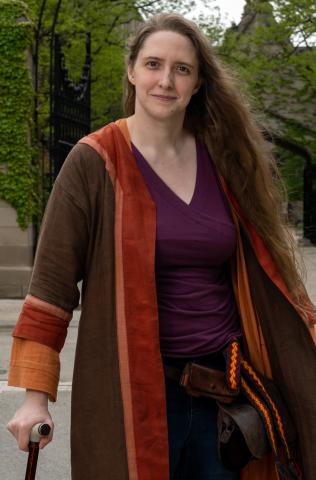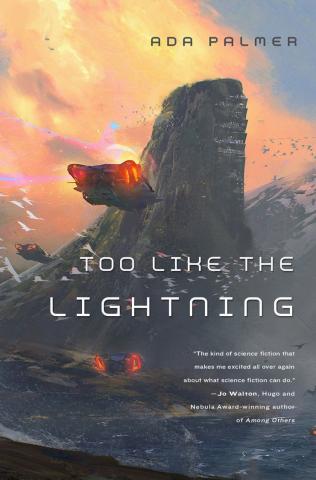Ada Palmer’s Terra Ignota named a Hugo Award finalist
The history professor uses her expertise to build a complex world set in the year 2454 in her sci fi book series.
By Sarah Steimer
When Ada Palmer steers into the future in her novels, she doesn’t keep history in her rearview mirror. Instead, the past is a useful roadmap as she designs the worlds and stories in her books. This careful eye toward both past and future is likely one of the reasons her series, Terra Ignota, is a finalist for the "Best Series" Hugo Award — the highest literary award in science fiction and fantasy publishing.
“When you're reading it, the history comes through on every single page, and readers constantly comment, ‘You can really feel this is being written by a historian,’” says Palmer, a UChicago associate professor of Early Modern European History. “Some people find it funny for a historian to be writing science fiction, and they say the future is the opposite of the past. (But) there's nothing more like the future than the past. It's a long period of time in which societies change and disruptive technologies appear and political groups shift.
“Being a historian teaches you how to think about change over time. And so it gives you the tools for thinking through a really deep and detailed world.”
The Terra Ignota series consists of Too Like the Lightning (2016), Seven Surrenders (2017), The Will to Battle (2019), and Perhaps the Stars (2021). Set in the year 2454, the books follow the events that lead the world to war for the first time after three centuries of peace after the end of the nation state.
Palmer’s historical expertise adds a layer to her storytelling that is sometimes missing in popular sci-fi tales. For example, Star Trek imagines a future that doesn’t reimagine how our social and political norms might develop further. It instead maintains our current lives — for example, the nuclear family or the average number of working hours — and places them in the context of space and advanced technology. Palmer, on the other hand, recognizes that with the passage of time comes change.
“A historian who knows how recent and fleeting those developments are looks at the future and says, ‘Well, of course, the family unit will be different. Of course attitudes toward gender will be different. And which countries are in the European Union will be different?’” she says. “Those things are not stable.”
This eye to societal evolution is something Palmer teaches in class and presents in her books. Two such themes that appear in her work explore the expanding empathy sphere and how two seemingly opposing truths can coexist.
In the books, Palmer describes the way civil rights have evolved to include intelligent animals. It builds on how rights and recognitions have expanded throughout history: Once we debated whether poor white men should own property, and today the conversation focuses on trans individuals’ rights, while tomorrow the sphere will evolve further. She’s teaching her audience that we live in a world that is constantly progressing.
“It’s continuity rather than sudden disruption,” Palmer says, noting that she examines this when teaching the progression between the Middle Ages and the Renaissance. “I sometimes describe it as a wedge: When the wedge gets wider at one end, it's finally wide enough to be the doorstop. But that end of the wedge isn’t categorically different from the thin end of the wedge — it's just that that's the point at which it suddenly hit something and was noticed. That's also the difference between what our future is going to be like and our present, that certain things are developing continuously. Then they’ll hit a particular moment when they're big enough to hit something else and matter in a new way.”
Palmer also explores dualities in our culture, underscoring that the world isn’t black and white. For example, the future she imagines in Terra Ignota shows how people have become comfortable with censorship — yet it’s not necessarily dystopian. There are trade-offs: Yes, there’s censorship, but there’s also incredible advances in medicine and unprecedented political self determination. It feels sometimes like a utopia and sometimes like a dystopia, which she says is her way — as a historian — of commenting on how people from 200 years ago would likely feel about society today.
She also uses lessons in opposing forces to show students and readers the interplay between large cultural shifts and individual actions. Yes, the floodwaters build, she says, but individuals are digging channels that direct those floodwaters.
“That’s a very important way to talk about history and something I try to bring out in my teaching as well,” Palmer says.”It's important for people to feel like they have real power to do things that make a difference — because it's true — while also acknowledging that the giant forces are there, and that the actions that we take are largely empowered by the way they affect those forces rather than us being independently powerful.”
Palmer describes the narrative style of hopepunk, a genre that depicts elements of human nature such as teamwork, honesty, and resilience, but counters purity narratives by including unfinished projects or compromise. We often struggle to acknowledge that partial victories are still victories, she says.
“Another thing that's united in my teaching and in the fiction is looking at how much of history is partial victories,” she says. “I don't know if I could point to a complete victory.”
The Hugo Awards are voted on and awarded at Worldcon, the World Science Fiction Convention, in September. Worldcon is held in a different city every year and — notably — will be held in Chicago this year, aptly called Chicon 8.
 THE UNIVERSITY OF CHICAGO
THE UNIVERSITY OF CHICAGO



